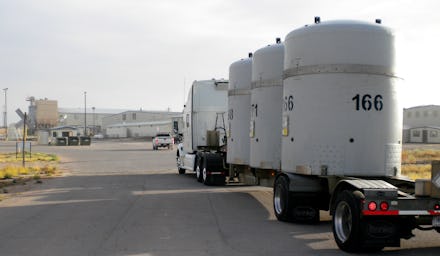A Whole Bunch of Radioactive Material Has Gone Missing In the Worst Possible Place

The news: Authorities in Kazakhstan are on high alert after a container holding highly radioactive material mysteriously disappeared while in transport in the western region of the country on Sept. 2.
Yes, you read that right. Radioactive material, which is sometimes used to build makeshift bombs, is missing in a region only a few thousand miles from Iraq, Iran and Syria.
A container holding radioactive isotope caesium-137 reportedly "fell off" of a vehicle while in transport, Al Jazeera reported. Although it's still unclear to Kazakh officials exactly how serious a threat the missing radioactive shipment may pose, it's extremely troubling that a large batch of potentially dangerous materials — in this case, weighing more than 100 pounds — can so easily vanish without a trace.
Why is this alarming? Caesium is used in an array of products ranging from medical to industrial purposes. However, it can also be used to construct home-made radioactive weapons or "dirty bombs" as they're often called. The Telegraph reported in 2011 that U.S. diplomatic cables obtained by Wikileaks revealed that NATO security chiefs told member states at a January 2009 meeting that al-Qaida was developing an arsenal of "dirty radioactive IEDs" — roadside bombs laced with radioactive material — that could be deployed against British forces in Afghanistan.
This year has seen several high-profile cases in which radioactive material was stolen: one in Mexico in July and another that month in a section of Iraq controlled by the armed group Islamic State (IS). The missing material in Iraq likely poses little threat, according to U.S. officials, but experts say IS territory may become a hot spot for stealing radioactive materials.
In light of the Islamic State's threats to the West, possibly including biological warfare, it would behoove the rest of the world (including the United States) to wise up and tighten up overseeing the transport of radioactive and nuclear products so they don't end up in the wrong hands.
The good news is that in the past 10 years radioactive material has been used less and less in criminal activity, but that doesn't mean that it never happens either. Andrew Bieniawski, the vice president of material security and minimization at the Nuclear Threat Initiative, noted that "there's concern that these [radioactive materials] are widely spread and easily accessible. They're used in everything from oil wells to the medical industry. You have thousands of these sources around the world, and people don't realize they're a threat."
And while education is key to helping to protect people worldwide, at the heart of this is a policy issue: the need to ensure that nuclear and non-nuclear states work in close collaboration to monitor and regulate the flow of radioactive materials around the world. If we improved the policies for the usage and transport of radioactive materials, we wouldn't have to be concerned with the latest development in Kazakhstan to begin with.